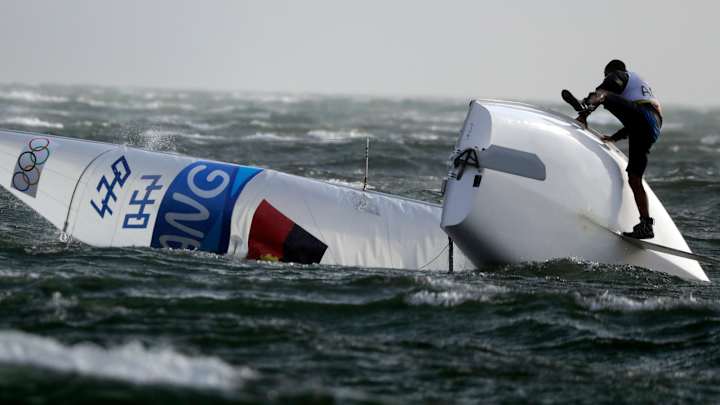Foul weather hits Olympics, on the track and at sailing

RIO DE JANEIRO (AP) It was hectic for weather forecasters at the Olympics: high winds, driving rain, fire. Only ice was missing. It was a nightmare for the athletes.
At the Olympic Stadium, the song was already cued up. So when a downpour hit Monday night it wasn't long before ''Singin' in the rain'' was blaring.
Pole vault finalists, discus throwers, and hurdlers all went scurrying for cover when the rain kept falling and turned the blue track into a series of puddles and pools.
It was distinctly foul weather, particularly in discus.
Earlier on Guanabara Bay, a strong wind from the southwest blew across the Rio de Janeiro Games sailing courses, forcing the medal race in the women's Laser Radial to be postponed. A brush fire close to the mountain bike racecourse had officials monitoring what to do as practice there starts Wednesday. It caused light ash to fall on the playing surface of the nearby field hockey venue.
At the track and field, the bad weather almost claimed an Olympic champion. Sandra Perkovic had two fouls in wet and slippery conditions and was one discus throw away from being eliminated. In drier conditions, she came through with an automatic qualifying measure for the final. She celebrated like she had won. Denia Caballero, the world champion from Cuba, also needed a qualifying throw on her final attempt after two fouls.
The wet discus was difficult to grip.
''I felt like it was a bit of a butterball in my hand. It was slipping out and before I knew I was like, `man, that was my throw,''' said U.S. thrower Whitney Ashley, who had three fouls.
The discus was so slippery that 10 of 17 athletes had fouls on their first attempt, with many landing in the protective netting.
The 110-meter hurdles heats were hard hit, prompting organizers to run a special race later in the night.
''It's atrocious. It's hard to compete in weather like this,'' said Jamaican hurdler Omar McLeod, who won the first heat amid heavy rain. ''The water is beaming down in your face and your eyes and it's real hard.''
It's a risky event that already requires high precision.
''You're worried about getting hurt,'' McLeod said.
His teammate Deuce Carter was initially worse off. He slipped and slid past the finish of the next heat before he was disqualified.
''They could've stopped it before. When I went out, the track was soaking,'' he said. ''I put my hand in water, basically a bucket of water.''
Some found it hard to comprehend why the first two of five heats were allowed to go ahead before rain finally forced a delay of about 25 minutes.
The non-qualified hurdlers from the first two heats were given a second chance - and it paid off for Carter - when organizers added a special race at the end of Monday night's program to give them a chance to qualify on times. The first four in the five original heats qualified automatically for the next round, leaving the next four places to be decided on times. Carter won the extra race in 13.51 seconds, good enough to advance.
''This decision was taken to ensure fairness, because the conditions for heats 1 and 2 were dramatically different than the other heats,'' the IAAF, track's international governing body, said.
There were some amendments in the pole vault as well. The final was already affected by gusts of wind swirling through the stadium and organizers decided to start again from scratch.
On the bay, the sight of bobbing boats caused trouble enough earlier in the day.
''Everyone has some form of damage to their boats, whether it's a bit of wear and tear on the sails, to people probably lost sails out there because it got that windy,'' defending 49er gold medalist Nathan Outteridge .
